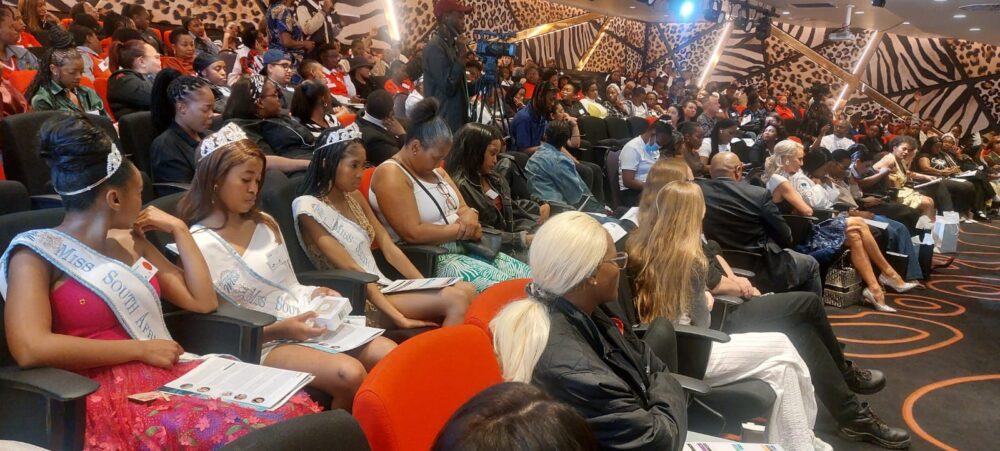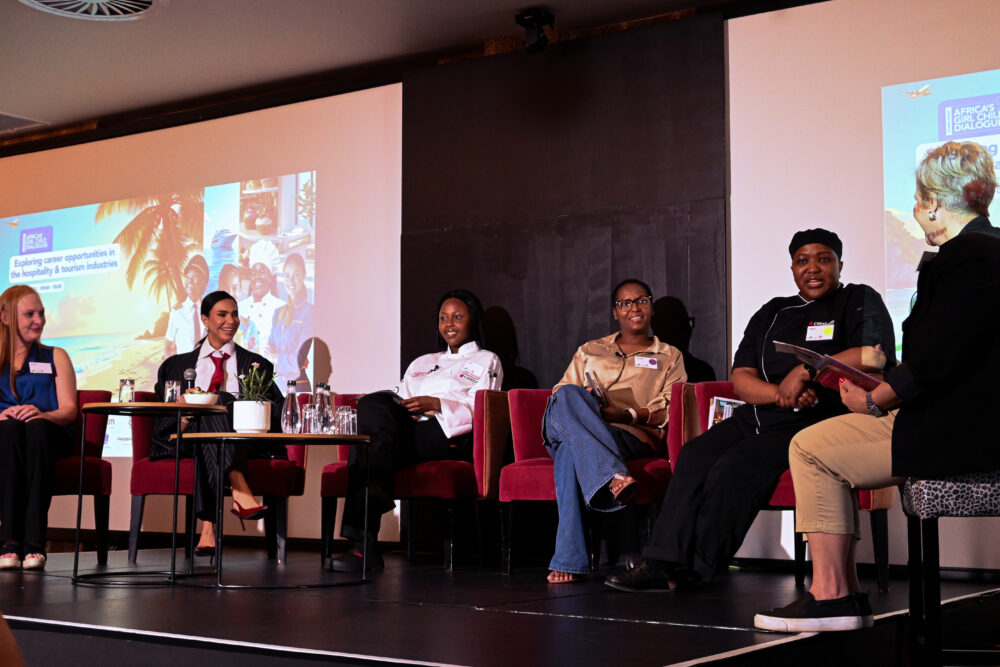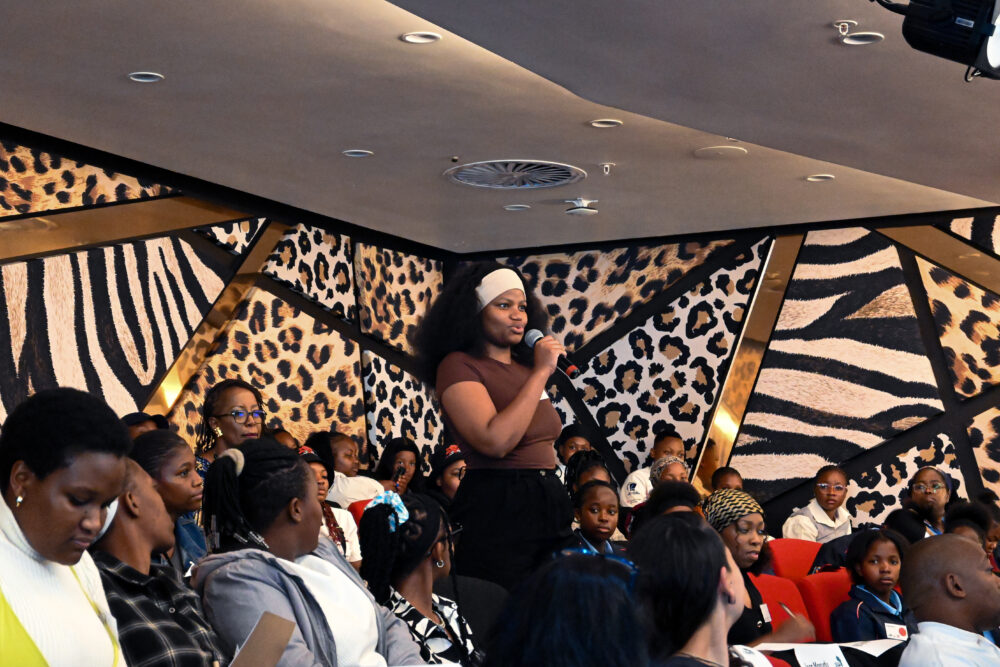With the current high unemployment rate, particularly among the youth, South Africa and the rest of Africa can leverage the tourism and hospitality industry to address this enduring crisis. According to experts, the sector is a significant driver of economic growth because it creates a wide range of jobs across various economic sectors.
Good Governance Africa (GGA), in collaboration with the Mail & Guardian, hosted the fourth iteration of its annual Africa’s Girl Child Dialogues to highlight and explore opportunities within this industry. Held at the Hotel Sky in Sandton, the event was broadcast live from a packed auditorium to audiences in Nigeria, Ethiopia, and Zimbabwe.

Empowering voices: Girls as Africa’s storytellers
Master of ceremonies, Candy Kasonkomona, an aviation, travel, and tourism expert with extensive experience across the African continent, noted that in South Africa, the tourism and hospitality industry is expected to support nearly 1.9 million jobs this year alone. Across Africa, she added, tourism is not only the backbone of the economy but also a source of employment for millions, with women making up nearly 69% of the workforce. Globally, about 40% of all jobs in the tourism and hospitality sector are held by women.
The aim of the dialogue, Kasonkomona said, was to “explore how your voices, talents, and commitments can shape how our continent is seen, experienced, and remembered by the world.” She added that this industry does not just create jobs, it is also “an ambassadorship in motion.” “When you are in this industry, you become a storyteller of your people, your culture, your history, your food, and your heartbeat. You teach your visitor who we really are,” she said.
The dialogue embraced five key goals, including to understand the wide range of career paths in the tourism and hospitality industry; create a platform for girls to ask questions and engage with panelists; discover how education and discipline can open up opportunities; connect with mentors, professionals, and experts who can guide them; and inspire the girls to see themselves as global citizens ready to lead Africa’s tourism industry in the future.
There were four panel discussions, each focusing on a specific theme within tourism and hospitality. The idea was to expose the girls to a variety of career pathways they could pursue. At the end of each discussion, panellists fielded questions from the audience. Boston City Campus generously offered bursary vouchers or giveaways for short courses in tourism and hospitality. Based on the quality of questions, each panellist selected a winner to receive a study voucher.

Access and support as catalysts for growth
In her keynote address, Dr. Deonita Damons, director of Boston City Campus, highlighted the importance of access to opportunities and support. She said there are many young girls in rural areas of South Africa and across the continent who do not know that such opportunities exist. “They don’t understand that there is a seminar taking place that can introduce them to the world and the sector of tourism,” she said. Some had the exposure and understood that hospitality and tourism are not just about serving others, but also about leading, being creative and innovative, and representing one’s culture to the world.
“So, my message today is about access to opportunity, recognising that it is access and support that allow the girl child to be ready and thrive when opportunity comes knocking,” she said.
Dr. Damons also pointed out that South Africa and Africa are still wrestling with legacies of exclusion — historical, systemic, and cultural. She said that according to statistics, women are the backbone of the travel and hospitality industry. They served as hosts, caretakers, and cooks, but not always as decision-makers. “We need to change how we see hospitality and the leaders in the sector. We can never say there is no talent; there has always been. The problem is not having access. And access is more than just being allowed in; it is about empowerment, about having the right keys in the form of information, resources, networks, mentorship, and most importantly, confidence. Because once you are ready, you won’t hesitate to take your chances.”
She added that if a girl learner is given the right key, it enables her to step up and say, “I can, because I know how.” “The moment you rise, you need someone to hold your hand and support you – that is where the industry comes in,” said Dr. Damons. “Access is a two-way bridge. On one hand, there is opportunity; on the other, there is readiness. Those bridges need to be strengthened to ensure the girl child can cross them and make her dreams come true.”
She advised the girls to grab opportunities with both hands whenever they arise. “Opportunities may manifest in different ways, be it through volunteer work, studying, or working extra hours. Don’t wait until you are perfect, because being ready is not about perfection – it is about being prepared and adaptable. When you are ready, even the slightest opening can become a doorway to your destiny.”
Dr. Damons said the industry must broaden opportunities, accommodate, and empower as many young girls as possible – because when a girl child rises, the industry rises, and the community rises. “To every woman in the industry, open the door for your fellow sister, because the one before you made it possible for me,” she concluded.

Exploring career opportunities
The first panel discussion looked into work opportunities in the tourism and hospitality industry. Professor Nicola Wakelin-Theron, head of the University of Johannesburg’s School of Tourism and Hospitality Management, moderated the conversation. The panellists included Andile Magwaza from Capsicum Culinary Studio in Rosebank; Gertrude Moropodi, marketing coordinator at Boston City Campus and Boston Media House; Unami Binda, a second-year student at Capsicum Culinary Studio; Unaiza Suliman, founder and CEO of Uniq School of Class and UniQ Brows; and Nicole de Jager from Capsicum Culinary Studio in Rosebank.
Professor Wakelin-Theron said the tourism and hospitality sector encompasses many areas, each of which can create sustainable jobs. For instance, transport can be divided into rail, road, air, and maritime. Other related opportunities include restaurants (chefs and wait staff), hotels (housekeeping and management), travel agencies, and tour operators. Entrepreneurs can also start their own businesses – such as tour services, catering, and craft stalls — as part of the hospitality and tourism value chain. Importantly, she said, a qualification is not a requirement to get involved in tourism and hospitality. “One just needs to be passionate and understand the industry,” she added.
One of the girls asked if she would be able to succeed in tourism and hospitality as an introvert. Magwaza assured her that being an introvert is not a limitation and that she should use it as a strength. “What counts is passion and commitment to the profession,” said Magwaza. “Never allow people to use this to pull you down.”
Sena Ndebele, founder and owner of Heights Events Management in Zimbabwe, said her passion for tourism and hospitality was ignited when she was a diplomatic spouse in Tanzania, where she used to do catering. In 2008, she founded her events company specialising in weddings. She advised the girls to be patient and passionate about what they want to achieve.
GGA’s social media coordinator, Ntsika Maseko, asked her panel what non-transferable academic skill they considered essential for girls either pursuing a particular venture or starting out. Her panel included Claire Opperman, Capsicum Culinary Studio’s brand marketing manager; Refiloe Sisoko, managing director of Phoenix Business Enterprises; Notsinkelelo Khunju from ActionAid South Africa; and Zakhona Mvelase, founder of African Women Against Corruption Network.
Khunju stressed the importance of empowering and equipping the girl child with the skills and knowledge of public speaking. “Shame dies in the spaces where voices are given a platform. More importantly, injustice dies as soon as conversations are started. Young women should know when their rights are being violated, the systems that contribute to this, and how to mobilise as a group.” She added that these are valuable skills that cannot be taught by any academic institution.
Mvelase concluded that there are three things can take you to the top: passion, commitment, and integrity.
Access, training, and seasonality
The third panel discussed challenges and opportunities associated with the industry. Facilitated by GGA’s Busisipho Siyobi, the panellists included Inge Dykman, Hotel Sky Sandton’s group director of sales and marketing; Elsu Gerike, head of education at the South African Chef Association; and Jean Morudu, Flight Centre’s recruitment business leader. They addressed some of the hidden barriers to access in the sector, agreeing that the major stumbling block is the high cost of courses, particularly in culinary education.
As the industry is seasonal, the panel also discussed what girls can do during the off-peak period. Morudu suggested that they use this time to get more training, learn about products and services in the sector, and engage with clients. Dykman argued that South Africa is a sought-after tourist destination and that the sector is constantly busy. Girls, she said, can use this period to volunteer in different sections of hotels to gain hands-on experience and later choose a segment they enjoy most.
On skills development and training, Gerike pointed out that culinary training is expensive and suggested that the girls explore online courses — both accredited and non-accredited — to prepare themselves before entering the industry.
The final panel was facilitated by James Byrne, co-founder of the International Tourism Film Festival Africa (ITFFA). Members of the panel included Caroline Ungersbock, also a co-founder of ITFFA and involved in the Sustainable Tourism Partnership; Naledi Mphahlele, Black Brain Productions’ head of department in script supervision; and Alti Fourie, head of channel at People’s Weather TV. They shared their experiences to inspire the girls and emphasised the importance of passion and purpose.
Fouche encouraged curiosity and imagination as critical values that can help the girls succeed. “Get to know yourself, your values. Take some time to understand your version of success,” Fouche advised. Mphahlele, who is also studying International Relations, shared how she balances her demanding TV work with her studies through discipline and routine. Byrne concluded by saying, “Find your passion, something that makes you wake up in the morning.”
Inclusion and leadership for Africa’s future
The dialogue highlighted the need for the tourism, travel, and hospitality industry to accommodate the girl child by expanding access and making information and opportunities more available. Although most of the workforce in tourism is made up of women, they should not only occupy lower positions but also be appointed to leadership roles. Key industry players were encouraged to collaborate to grow the sector and create more sustainable jobs to help address the country’s youth unemployment crisis.